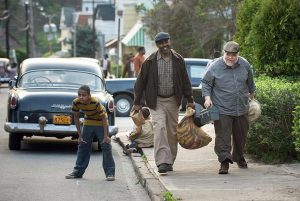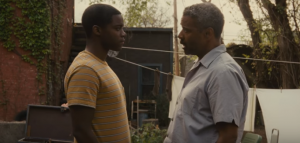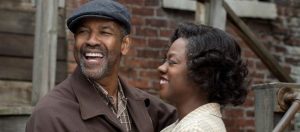
If anybody were to bring August Wilson’s play “Fences” to the silver screen, it’s Denzel Washington. The man knows the play just about as well as August did, having won a Tony for his performance in the revival in 2010. His knowledge of the play shows in his performance, as he takes to Troy Maxson as if he were him. He cares so deeply about the production that he’s adapted it without virtually any changes, enough to give Wilson the screenplay credit despite having passed away over a decade ago. As far as adaptations go, they don’t get much more respectable than this.
The story is still the same. The Maxson family is getting by in 1950s Pittsburgh. The patriarch, Troy, is a garbage man still upset at the world that held him back from being a professional baseball player due to the color of his skin. His son, Cory (Jovan Adepo), is being recruited by a college football team, which Troy is having none of. He doesn’t trust the man to not hold his son down, with a hinting that there may be a tinge of jealousy beneath the surface. His version of tough love towards his son causes friction between the two, with Rose (Viola Davis) being tasked with simmering. This is but one of many issues plaguing the Maxson household, others lying beneath the surface.

It is obvious the film is based on a play, as most of the action takes place in the backyard or in the confines of the house. On occasion, the film ventures out into the streets of Pittsburgh, Troy and his brother in arms, Jim Bono (Stephen Henderson), hanging on the back of their garbage truck. For the most part, though, they are contained to the house. The backyard is the most popular place, wherein Troy tirelessly slaves over his fencing project. This is the trigger to
It’s not the condensed locale that makes the film feel like a play, but its presentation. Characters waltz in and out of frame concurrently, as if waiting on their queue. This feels natural in a play, as it falls in line with the presentation. In a film, however, it comes across as awkward. Panning out to reveal one character arriving just as another is leaving on the other side feels artificial. It’s a minor issue, but one that slowly eats away at the drama. It prevents the production from ever feeling truly realistic, containing it the world of theatrics. This works better on stage as the live atmosphere overcomes the theatrics, the two coming together in marriage. In a film, however, it’s a bit stilted.

Another aspect that carries over from the play somewhat awkwardly are the occasional soliloquies and prolonged dialogue exchanges. The latter especially becomes a problem, with almost every scene running on far past their expiration date. The emotion contained in the speeches still resonate, but lose some of their luster. Almost every scene is stronger at its outset than its exit due to the latter arriving too late. The characters start to repeat themselves in an effort seemingly to pad the time and/or drive home their point. Again, this works well on stage as it derives its energy from the live crowd. Its existence does tie in to padding in order to give the paying audience their money’s worth (if you fork over a pretty penny for a play, you best get a couple of hours out of it), but the delivery feels more organic to the atmosphere. Film doesn’t have that live atmosphere, nor needs the padding to justify payment (movie tickets, while costly, don’t come close to that of Broadway prices).
It’s in this dedication to August Wilson’s play that Denzel Washington stumbles in his adaptation. It’s an admirable stumble, one that doesn’t sink the film, but does prevent it from reaching greatness. What keeps it from sinking is in retaining the play’s raw emotion. The central themes of race relations, masculinity, and family all ring through, with the subplots never feeling underdeveloped or cheap. The financial struggles of Troy’s first son, Lyons (Russell Hornsby), cements the father’s trust issues; the son’s limited screen time complements his dense connection (and acts as clever foreshadowing). Troy’s mentally unfit brother, Gabriel (Mykelti Williamson), is never scoured for tawdry comedy or drama (sans one cheesy moment). Both are organic to the story, finding the humor in tragedy and the pain of reality. His efforts in the war resulting in nothing but a metal plate in his head and a nominal monetary settlement feed into Troy’s paranoia and contempt for society. He finds solace only in Rose and even that is being challenged.

Wilson wisely used Troy’s soliloquies and diatribes to convey the character’s shadiness and woes. Washington does the same in his direction, keeping an air of mystery around Troy. One can never trust a word that comes out of his mouth, as it could easily be a story cooked up to help him pass the time. Rose will step in and squash his comedic antics, providing both an insight into their relationship and mirthful humor. This keeps the viewer on their toes, questioning his every word and challenging his decisions. Sometimes it’s noticeable when he’s doling out the truth or simply fibbing. One scene in particular highlights both: his reveal of his rocky relationship with his father shows a remorseful, timid side to the man, one that clearly isn’t for show. What is for show is the kicker, his anecdote of walking two-hundred miles into town looking for a job most definitely an exaggeration. It’s clear in his bumptious demeanor that he’s crafting a story. Other times it’s not so obvious, and that’s the beauty in Denzel’s performance!
While the transition from stage to screen may be gauche at times, the heart is still there. The performances are just as powerful, with Denzel shrewdly grounding them from showboating constantly (and when they do, it’s earned). The central themes are made clear without being too overt. The drama is there, albeit stretched a little too thinly. The only reason to adapt “Fences” to the silver screen is to reach a wider audience. For that alone, Washington’s film is successful.
Final Rating: B
